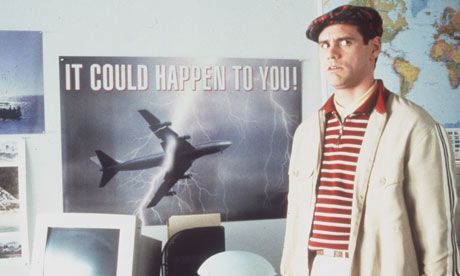In The News
 Through
most of human history, the mentally ill spoke of seeing demons,
spirits, and ghosts. Those delusions are different now. The Truman Show
delusion is one in which the subject is convinced that the world they
perceive is not real, but is being manipulated by others for the
entertainment of the masses. Just like in the movie. The argument can be
made that the Truman Show delusion is not really new, but an update of
classic paranoid schizophrenic delusions of the past, reflecting our
technological world.
Through
most of human history, the mentally ill spoke of seeing demons,
spirits, and ghosts. Those delusions are different now. The Truman Show
delusion is one in which the subject is convinced that the world they
perceive is not real, but is being manipulated by others for the
entertainment of the masses. Just like in the movie. The argument can be
made that the Truman Show delusion is not really new, but an update of
classic paranoid schizophrenic delusions of the past, reflecting our
technological world.Persecutory delusions, for example, can be found throughout history and across cultures; but within this category a desert nomad is more likely to believe that he is being buried alive in sand by a djinn, and an urban American that he has been implanted with a microchip and is being monitored by the CIA. ‘For an illness that is often characterized as a break with reality,’ they observe, ‘psychosis keeps remarkably up to date.’ Rather than being estranged from the culture around them, psychotic subjects can be seen as consumed by it: unable to establish the boundaries of the self, they are at the mercy of their often heightened sensitivity to social threats.Paranoid delusions have been turned into almost believable fiction, in movie such as The Matrix, Total Recall, and, yes, The Truman Show. And some "reality" shows do manipulate everyday people with pranks and covert surveillance for our entertainment. But "real" reality is catching up fast. In the past, people who spoke of magnetic waves in the air and secret government surveillance were considered crazy. Now those things are part of everyday life. Read more about the evolution of paranoid delusions at aeon.
In this interpretation, the Truman Show delusion is a contemporary expression of a common form of delusion: the grandiose. Those experiencing the onset of psychosis often become convinced that the world has undergone a subtle shift, placing them at center-stage in a drama of universal proportions. Everything is suddenly pregnant with meaning, every tiny detail charged with personal significance. The people around you are often complicit: playing pre-assigned roles, testing you or preparing you for an imminent moment of revelation. Such experiences have typically been interpreted as a divine visitation, a magical transformation or an initiation into a higher level of reality. It is easy to imagine how, if they descended on us without warning today, we might jump to the conclusion that the explanation was some contrivance of TV or social media: that, for some deliberately concealed reason, the attention of the world had suddenly focused on us, and an invisible public was watching with fascination to see how we would respond. The Truman Show delusion, then, needn’t imply that reality TV is either a cause or a symptom of mental illness; it might simply be that the pervasive presence of reality TV in our culture offers a plausible explanation for otherwise inexplicable sensations and events.

No comments:
Post a Comment